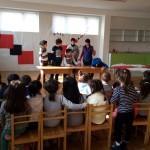Digitech Educational Camp is a Spirit Transfering Platform
Primary tabs
Transition from primary school to middle school is a period of crisis for learners. At primary school they are constantly under the auspices of the primary school teacher and they live in their warm nest like fluff nestlings shrouded with care. Then the primary school teacher is substituted by activity organizer who is likewise caring and dear; they have got used to each other for years and have carried on general trainings and educational projects together. At primary school children have been used to being constantly protected and encouraged with praise or mark (sometimes overestimated) for their work no matter how it has been done.
And then they move to middle school. They join the children who have come from other primary schools, and they see that there are other bests here, and there aren't the ones who watch and direct them every minute, and they themselves are responsible for their work, choice and deeds. Learners are thrown into a panic by such transition to independence: Where have I come to? What do they want from me?... They don’t understand the teacher’s expression “Try it again”. They think, “Didn’t I do it well?” Any correction of mistakes in a most tender way alienates the teacher from the learner. There starts the most important stage, the stage of getting to know and accepting each other. A jeweler’s thorough work is needed here: step by step, particle by particle, inch by inch... It is not a realistic task to inspire and encourage the whole class of 25 learners in this situation; we need time and a good opportunity.
The winter educational camp with its Digitech and Science-technical reviews became that long wanted opportunity. The teacher became a camp counselor. 40-45-minute limitations were eliminated, and the core was seen, groups of 8-10 learners ready to work with inspiration without any compulsion. One group consists of learners who are engaged in mastering their skills with rolling skates, another group is performing science experiments downstairs in the science lab, and another group wants to eave lunch, and the refreshment room is at their disposal. There aren't any restrictions. Are they tired after two days of hard work? There is no problem. We go to the skating rink with our group to have a rest and a little fun. On the next day we are inspired to finish what we have left unfinished and to see the result of our work. The teacher doesn't have to keep the class under control or to organize the learners' effective activities for 40 minutes. The teacher's task has also changed.
The teacher's task is something else: to organize the work of the group of inspired students so that the result could please the teacher, and the time spent on it could be justified.
It turned out that we could measure the amount of the learners' inspiration.
After having watched and discussed the video film, in which they were presenting Tumanyan’s tales, there was a suggestion that we should go to one of our primary schools and make our presentation live there. The whole group agreed to that suggestion unanimously. At first they performed the tales at Junior Art School. The young learners’ frank and immediate reaction, applause and shouts at the most unexpected moments transferred so many positive impulses to the tale narrators that they decided to visit the New School on the way from the Junior Art School to the Mother School without any hesitation. They were eager to make their performance at their just in their primary school.
How can this activity be developed? We may try to make it a “TV-Tale”. The media will help the learners to disseminate their work. On the other hand, live contacts also help to obtain lots of skills: overcoming excitement, adjusting the role play to an unexpected situation. In this way they may become a mobile theater.
Finally, I wish formal lessons lasting 40-45 minutes didn't break their enthusiasm.

